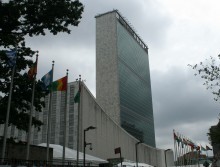 The European Union passed more sanctions on the Syrian regime of Bashar al-Assad over their violent crackdown on protesters in the country last week, and Europe continues to call for United Nations sanctions against the Assad government. An EU spokesman, speaking with The Mideast Update via email, said on Wednesday that the EU is hoping the UN Security Council will back sanctions on Syria as soon as possible.
The European Union passed more sanctions on the Syrian regime of Bashar al-Assad over their violent crackdown on protesters in the country last week, and Europe continues to call for United Nations sanctions against the Assad government. An EU spokesman, speaking with The Mideast Update via email, said on Wednesday that the EU is hoping the UN Security Council will back sanctions on Syria as soon as possible.
Assad’s autocratic government has brutally repressed protestors of the regime over the last six months. A UN official said on Tuesday that at least 2700 have died since March as a result of the crisis, according to a UN meeting recap posted on the UN website. Amnesty International also published a report last month detailing accusations of torture and deaths of people following their arrest by the regime.
In response to the violence in Syria, the EU spokesman confirmed to The Mideast Update that the EU still “supports strong and united action against the Syrian regime. We hope the Security Council will support firm action.” More specifically, the EU spokesman noted that the EU already has sanctions on Syria and that they “favor international action based on UN sanctions.”
Last Friday, the EU passed additional sanctions on the Syrian oil sector, targeting investment in Syrian companies, according to an EU press release. The EU spokesman told The Mideast Update the sanctions are “very significant.”
“We wanted to maximize the pressure on the Syrian regime,” said the spokesman regarding the European sanctions. “They are very significant, targeting oil exports, investment in the oil sector and further individuals and companies which back the regime.”
EU foreign policy chief Catherine Ashton said in a press statement last Friday regarding the EU sanctions on Syria, “I have said repeatedly that the regime’s repression against the Syrian people must stop completely, that detained protestors must be released immediately and that a genuine and inclusive national dialogue must be launched in Syria without delay.
“So far, the Syrian regime has resisted urgent calls from the European Union as well as the international community to take such steps. Therefore additional measures are necessary.”
Ashton noted the European sanctions were designed to “have maximum impact on the Syrian regime, while minimizing any potential negative impacts on the Syrian population.” She also said the EU “will consider further measures in the light of developments.”
Said Ashton in the press statement, “The EU continues to aim at putting an end to the repression and assisting the Syrian people to achieve their legitimate aspirations.”
Countries in Europe aren’t the only ones to sanction Syria. The United States have their own sanctions targeting the violent government and the Turkish Hürriyet Daily News said on their website Sunday that Turkey was also preparing sanctions on Syria in a variety of fields.
The top official at the UN has also been critical of Syria. On Tuesday, UN Secretary-General Ban Ki-moon met with Syrian Foreign Minister Walid Mouallem. A readout of the meeting provided by the UN said Ban “reiterated his call for an end to violence and for a genuine process to fulfill the legitimate aspirations of the people for comprehensive political change.”
(By Joshua Spurlock, www.themideastupdate.com, September 28, 2011)
